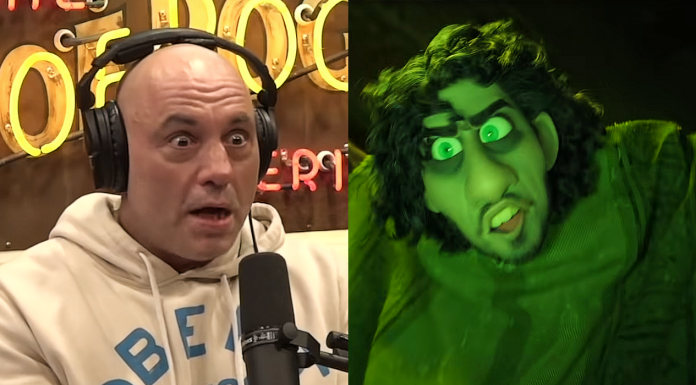(Ben Sellers, Headline USA) Libertarian podcaster Joe Rogan is being bombarded with attacks from the radical Left—some of which, it’s been speculated, may be well-funded efforts that go far beyond the caprices of a few embittered, hippie folk-singers.
The attempts to censor and/or deplatform Rogan from Spotify have triggered a cascade of backlash from both sides of the aisle, striking a nerve in the broader debate over the toxicity that surrounds cancel culture.
Ironically, Rogan’s “scandal” overlaps in the cultural Zeitgeist with an unlikely companion—the smash success of a Disney children’s song that touches on a similar aspect of cancel cuture, but from a much different angle.
The song, “We Don’t Talk about Bruno,” although steeped in the House of Mouse’s unique brand of leftist didacticism, may have stumbled inadvertently into condemning the very sort of gossip-driven mob mentality that Rogan is now fighting back against.
As fellow cancel-culture victim William Shakespeare observed, “misery acquaints a man with strange bedfellows.”
AN UNLIKELY HIT
For all his insufferable virtue-signaling and Obama schmoozing, Hamilton composer Lin–Manuel Miranda knows how to write a good song.
Through his recent Disney collaboration, scoring the newly released animated film Encanto, Miranda has solidified his status as a force to be reckoned with.
This melding of two pinnacles of wokeness, Disney and Miranda, yielded a suprisingly good output. The movie largely avoids the alienating pitfalls of social-justice moralizing to present, instead, an intricate but engaging human drama with picturesque Colombia as its backdrop.
I have always felt that food and art are the greatest of all cultural ambassadors—so, putting aside Disney’s past proclivity for canceling conservatives and its gratuitous foisting of “diversity” onto everything, I embraced the armchair tourism that Encanto‘s setting permitted. (It doesn’t hurt that I’m hoping, for selfish reasons, to cultivate in my young niece an affinity for world travel.)
Yet, Latin-American culture futher plays an important role in driving the film—particularly through Miranda’s infectious tunes, which Encanto uses to convey key plot points and character dynamics.
Atop the list of noteworthy songs is the film’s breakout hit, “We Don’t Talk About Bruno,” which reached No. 1 this week on Billboard’s top 100 after debuting at the No. 50 spot on Jan 8.
Eclipsing the Frozen hit “Let It Go,” Miranda’s “Bruno” became the first Disney animated song in nearly two decades to achieve this top-selling distinction—the last one being “A Whole New World” from 1993’s Aladdin.
Its success caught even its creator off-guard, with Miranda admitting that, within his prized songwriting repertoire, he considered the ditty something of an after-thought.
“I’m surprised it’s ‘Bruno,'” he told People magazine. “I feel like this is my ‘Send in the Clowns,’ which was the late Stephen Sondheim’s biggest hit and probably the most random of an incredible career and life making music. But I’ll take it!”
TAPPING INTO THE UNIVERSAL
The song’s appeal may boil down to its catchy beat, following a salsa-like rhythmic pattern that is similar to many other dance-friendly pop hits, as several YouTube remixers already have discovered.
However, NPR music critic Glen Weldon proffered on “All Things Considered” that there was a universal quality in the lyrics as well as the music.
“Every family has that thing that we all agree not to gossip about until you get one of your aunts alone away from the rest of the family, and then it all comes spilling out,” Weldon said. “People recognize that.”
In each verse, Encanto‘s ensemble cast gradually reveals a different fragment helping to form the complex mosaic of Bruno, the Madrigal family’s black-sheep prodigal son.
Without delving too far into plot points, almost every family member has a unique magical gift (control of the weather, super-sensitive hearing, shape-shifting, etc.).
Bruno’s power is a soothseeing ability that—in the grand tradition of many a prophet—proves to be something of a curse.
“He told me my fish would die—the next day, dead,” says one townsperson.
“He told me I’d grow a gut, and just like he said,” reveals another.
Many, of course, appear to be self-fulfilling prophesies for which Bruno himself has no particular agency. Nonetheless, they blame him for planting the ideas.
“Bruno says it looks like rain,” complains his sister. “In doing so he floods my brain.”
Meanwhile, other family members know only the stigma that surrounds the banished relative.
“Seven-foot frame, rats along his back, when he calls your name it all fades to black,” says his nephew.
A FAMILIAR REFRAIN
Miranda’s deconstruction of how and why Bruno became a verboten topic may work at the Disney level, but it also mirrors a sinister process all too familiar in America today.
Rogan is the latest in a long list of truth-speaking public figures to be made an example of—an alarming and ominous development in what began, innocuously enough, with the ostensibly noble virtues of political correctness and multiculturalism.
In Bruno’s case, small personal grievances gradually give way to fear and dehumanization, taking on a life of their own before spiraling out of control and threatening to destroy the very foundation of the Madrigal family.
So it goes with Rogan, whose sin was daring to invite intellectuals like Dr. Robert Malone and Prof. Jordan Peterson onto his show, during which they broached topics that leftist dogma has deemed unacceptable.
They aren’t upset with Joe Rogan because of his covid-19 perspective. They’re angry at him because he talks with people they hate. And they can’t stand that.
— Ben Shapiro (@benshapiro) January 31, 2022
FACING THE TRUTH
Both figures, Rogan and Bruno, are the bearers of unpleasant truths that imbue hapless victims with a desire to banish the messenger.
Bruno’s prognostications are not all bad, though. One niece, Isabella, receives a positive prophesy—that she will find true love and grow powerful—but is forced by the pressure from it into living a lie.
So, too, do red-pilled liberals find themselves forced to violate the natural order of the world based on the false premise that they should be grateful for their “privilege.”
But while fortune smiles on one, another niece, Dolores, looms in the shadows—as do many conservatives—relegated to speaking in hushed tones about the omnipresent truth looming just below the surface.
“I can always hear him sort of muttering and mumbling,” she says of Bruno, while desperately reaching out for someone to confide in: “Do you understand?”
Ultimately, extrinsic circumstances force the family to confront its demons rather than to continue living in denial.
Perhaps the same is true for America.
Interestingly, Miranda said that Bruno’s name came about a matter of pure happenstance.
I mean, “We don’t talk about ANKO?!” -LMM #Encanto https://t.co/yWDdpFAzL3
— Lin-Manuel Miranda (@Lin_Manuel) January 30, 2022
In our own real-world version, maybe a better fit than “Bruno” would be “Joe”—or, at the very least, “Brandon.”


